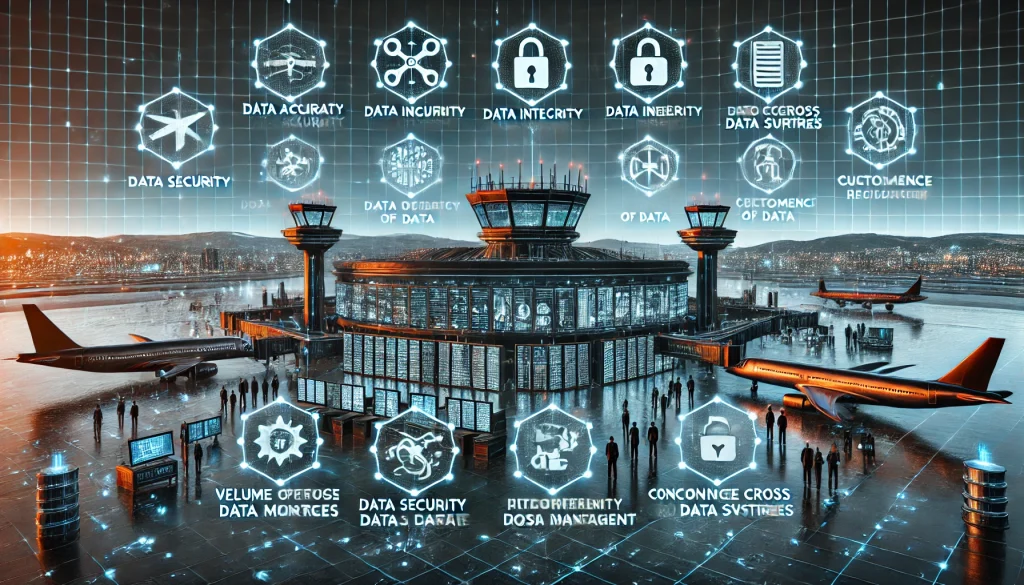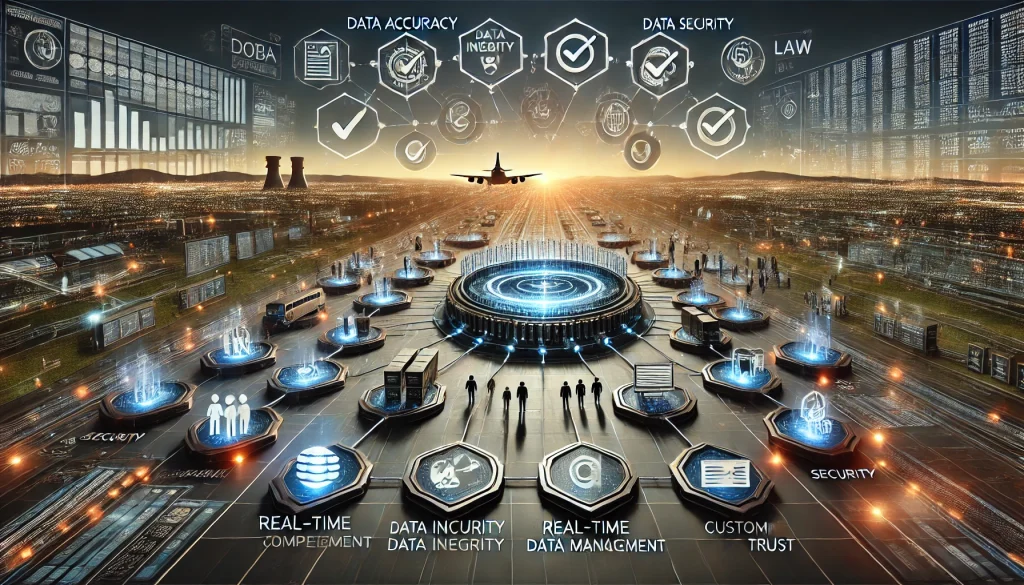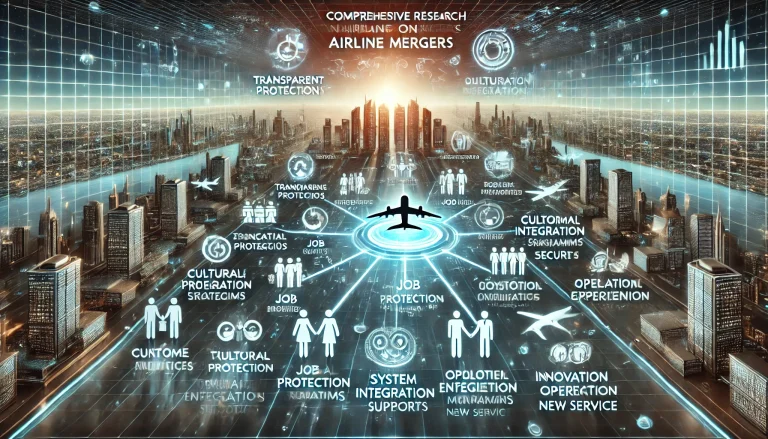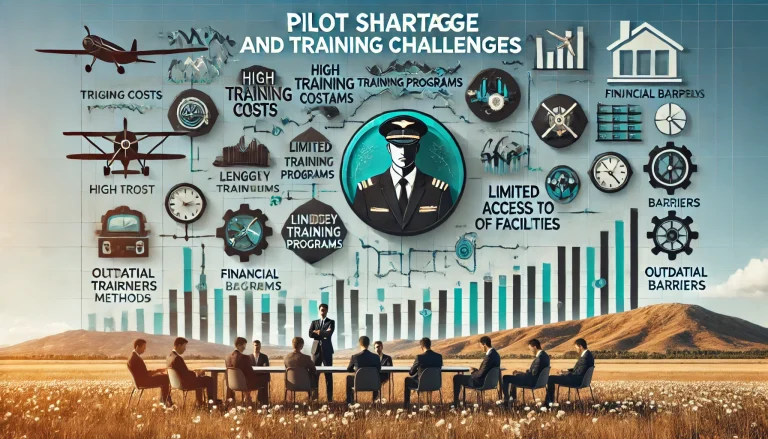Problem Statement
The aviation industry is increasingly reliant on data to drive flight operations, maintenance processes, customer service, and strategic decision-making. From flight schedules and maintenance logs to customer preferences and operational analytics, data is at the heart of nearly every aspect of modern air travel. However, the vast volumes of data generated and used by airlines and airports also present significant challenges, particularly in ensuring the accuracy, integrity, and security of this information.
Inaccurate or compromised data can have serious consequences. For instance, errors in maintenance logs or flight plans can jeopardize safety, while inaccuracies in customer data can lead to service failures and damage to customer relationships. Furthermore, inconsistencies across different data sources can result in inefficiencies, operational disruptions, and poor decision-making.
The complexity of managing data in the aviation industry is compounded by the fact that data is often collected from multiple sources, including onboard systems, ground operations, customer interactions, and external partners. Ensuring that this data is accurate, consistent, and up-to-date requires robust data management practices, advanced technology, and vigilant oversight.
Another critical concern is data security. As airlines and airports increasingly rely on digital systems, they become more vulnerable to cyber threats, including data breaches and cyberattacks. Protecting sensitive information, such as passenger details, operational data, and financial records, is essential to maintaining customer trust and complying with regulatory requirements.
To address these challenges, the aviation industry must invest in advanced data management solutions, cybersecurity measures, and cross-functional collaboration to ensure that data is handled with the highest levels of accuracy and integrity. This involves implementing data governance frameworks, adopting cutting-edge technology, and training staff to recognize and mitigate risks associated with data management.
Pain Points
- Data Accuracy: Ensuring that data collected from various sources is accurate and free from errors, which is critical for safety and operational efficiency.
- Data Integrity: Maintaining the consistency and reliability of data across different systems and platforms.
- Data Security: Protecting sensitive information from data breaches, cyberattacks, and unauthorized access.
- Inconsistencies Across Data Sources: Managing and reconciling discrepancies in data collected from different systems, which can lead to operational inefficiencies.
- Volume and Complexity of Data: Handling large volumes of data from diverse sources, which increases the risk of errors and inconsistencies.
- Real-Time Data Management: Ensuring that data is processed and made available in real-time to support timely decision-making.
- Compliance with Regulations: Adhering to strict data protection and privacy regulations, including GDPR and other industry-specific standards.
- Training and Awareness: Educating staff on the importance of data accuracy, integrity, and security, and providing them with the tools to manage data effectively.
- Technology Integration: Integrating advanced data management tools and technologies into existing systems without disrupting operations.
- Customer Trust: Maintaining customer trust by ensuring that their data is handled securely and accurately, and that their privacy is respected.

Future Vision
Our platform envisions a future where the aviation industry excels in managing data with the utmost accuracy, integrity, and security. To achieve this, the platform will support airlines and airports in implementing comprehensive data management strategies that address the challenges of data accuracy, consistency, security, and compliance.
Data accuracy will be a primary focus, with the platform advocating for the adoption of advanced data validation and verification tools. These tools will help ensure that data collected from various sources is accurate, up-to-date, and free from errors. Airlines will be encouraged to implement automated data cleansing processes that identify and rectify inaccuracies before they can impact operations.
Maintaining data integrity across different systems and platforms will also be a key priority. The platform will promote the use of data governance frameworks that standardize data management practices across the organization. This will include establishing protocols for data entry, storage, and retrieval, as well as implementing mechanisms for reconciling discrepancies between different data sources.
Data security is another critical area of focus. The platform will support airlines in strengthening their cybersecurity measures to protect sensitive information from breaches and unauthorized access. This will involve the adoption of encryption technologies, secure data storage solutions, and real-time monitoring tools that detect and respond to potential threats.
Real-time data management will be essential for supporting timely decision-making in the fast-paced aviation environment. The platform will advocate for the integration of advanced data processing technologies, such as cloud-based solutions and artificial intelligence (AI), to ensure that data is processed and made available in real-time. This will enable airlines to make informed decisions quickly and effectively, enhancing both safety and operational efficiency.
Compliance with data protection regulations, such as GDPR, will be another key consideration. The platform will provide guidance on navigating the complex regulatory landscape, ensuring that airlines adhere to industry standards and avoid potential legal and financial penalties.
Training and awareness programs will be crucial in fostering a culture of data integrity and security within the aviation industry. The platform will support airlines in developing training initiatives that educate staff on best practices for data management and cybersecurity. These programs will be designed to equip employees with the knowledge and skills needed to manage data effectively and mitigate risks.
By addressing these challenges and embracing advanced data management strategies, the aviation industry can enhance safety, efficiency, and customer trust. This proactive approach will not only improve operational performance but also position airlines and airports as leaders in data integrity and security.
Use Cases
- Advanced Data Validation Tools: Implementing automated data validation and verification tools to ensure data accuracy across various sources.
- Data Governance Frameworks: Establishing standardized data management practices to maintain data integrity across systems and platforms.
- Cybersecurity Measures: Strengthening cybersecurity protocols to protect sensitive information from breaches and unauthorized access.
- Real-Time Data Processing: Integrating cloud-based solutions and AI technologies to enable real-time data management and decision-making.
- Regulatory Compliance Solutions: Navigating data protection regulations, such as GDPR, to ensure compliance and avoid legal penalties.
- Data Cleansing Processes: Implementing automated data cleansing processes to identify and correct inaccuracies before they impact operations.
- Technology Integration: Seamlessly integrating advanced data management tools into existing systems without disrupting operations.
- Staff Training and Awareness: Developing training programs that educate employees on data management best practices and cybersecurity.
- Customer Data Protection: Ensuring that customer data is handled securely and accurately, maintaining their trust and confidence.
- Data Consistency Monitoring: Implementing tools to monitor and reconcile discrepancies between different data sources.
Target Users and Stakeholders
- User: Airline IT Teams, Data Management Officers, Cybersecurity Teams, Operations Managers, Customer Service Managers, and Compliance Officers
- Age Group: 30-60 years
- Gender: M/F
- Usage Pattern: Regular usage for managing, securing, and ensuring the accuracy of data in flight operations, maintenance, customer service, and decision-making
- Benefit: Enhanced data accuracy and integrity, improved cybersecurity, and compliance with data protection regulations
- Stakeholders:
- Airlines: Companies that rely on accurate and secure data for operations, customer service, and decision-making.
- Airports: Facilities that manage large volumes of data related to flight operations, security, and passenger services.
- Technology Providers: Companies offering data management, cybersecurity, and real-time processing solutions tailored to the aviation industry.
- Regulatory Bodies: Agencies that set and enforce data protection and cybersecurity standards for the aviation industry.
- Customers: Passengers whose data must be protected and managed securely and accurately.
- Maintenance and Operations Teams: Staff responsible for ensuring the accuracy and integrity of data related to flight operations and maintenance.
Key Competition
- Delta Air Lines: Known for its advanced data management and cybersecurity practices, ensuring the accuracy and security of operational and customer data.
- American Airlines: Implements robust data governance frameworks and real-time processing technologies to maintain data integrity across systems.
- Lufthansa: Focuses on data accuracy and security through the adoption of advanced validation tools and cybersecurity measures.
- United Airlines: Strengthens its data management practices with automated data cleansing processes and compliance with data protection regulations.
- Singapore Airlines: Invests in real-time data processing and AI technologies to support decision-making and enhance customer service.
Products/Services
- Delta Air Lines Cybersecurity Solutions: Implementing advanced cybersecurity protocols to protect sensitive information from breaches.
- American Airlines Data Governance Frameworks: Establishing standardized data management practices to maintain data integrity across platforms.
- Lufthansa Data Validation Tools: Adopting automated data validation tools to ensure the accuracy of operational and customer data.
- United Airlines Data Cleansing Processes: Implementing automated data cleansing processes to identify and correct inaccuracies in real-time.
- Singapore Airlines Real-Time Data Processing: Integrating AI and cloud-based technologies to enable real-time data management and decision-making.
Active Startups
- DataGuard: Provides comprehensive data management solutions, including validation, cleansing, and real-time processing tools for the aviation industry.
- CyberFlight: Specializes in cybersecurity technologies designed to protect airline data from breaches and unauthorized access.
- FlightData: Offers advanced data governance platforms that standardize data management practices across airlines and airports.
- RealTimeAero: Develops AI-driven real-time data processing solutions that enhance decision-making and operational efficiency.
- SecureJet: Focuses on compliance with data protection regulations, offering tools to help airlines navigate GDPR and other industry standards.
- CleanData: Innovates in automated data cleansing technologies that identify and correct inaccuracies in large data sets.
- AeroIntegrity: Provides data consistency monitoring tools that reconcile discrepancies between different data sources in aviation.
- SkyTrust: Offers customer data protection solutions that ensure the secure handling of passenger information and maintain customer trust.
- FlightSync: Specializes in technology integration, helping airlines seamlessly adopt new data management and cybersecurity tools.
- AeroAnalytics: Focuses on data-driven decision-making, providing analytics platforms that leverage accurate and secure data for strategic planning.
Ongoing Work in Related Areas
- AI-Driven Data Management: Researching the application of AI technologies to improve data accuracy, consistency, and real-time processing in aviation.
- Advanced Cybersecurity Protocols: Developing next-generation cybersecurity measures to protect airline data from emerging threats.
- Data Governance Standardization: Exploring methods for standardizing data management practices across the aviation industry to ensure consistency and reliability.
- Real-Time Data Analytics: Innovating in real-time analytics platforms that leverage accurate data to support operational and strategic decision-making.
- Compliance with Emerging Regulations: Researching the impact of new data protection regulations on the aviation industry and developing solutions for compliance.
- Cross-Platform Data Integration: Developing tools that facilitate the seamless integration of data management technologies across different airline systems.
- Customer Data Protection Innovations: Creating new methods for securing passenger information and ensuring compliance with privacy regulations.
- Operational Data Integrity: Focusing on the accuracy and reliability of data related to flight operations and maintenance, ensuring safety and efficiency.
- Big Data Management: Exploring strategies for managing and processing large volumes of data generated by airlines and airports.
- Cybersecurity Training and Awareness: Developing programs that educate airline staff on the latest cybersecurity threats and best practices for data protection.
Recent Investment
- DataGuard: $25M in Series B funding led by technology-focused venture capital firms, May 2021.
- CyberFlight: $20M in Series A funding from cybersecurity investors, September 2020.
- FlightData: $15M in Seed funding led by aviation technology investors, November 2020.
- RealTimeAero: $12M in Series A funding from AI and data analytics investors, January 2021.
- SecureJet: $10M in Series B funding from compliance-focused investment firms, February 2021.
Market Maturity
The market for data management and cybersecurity solutions in the aviation industry is rapidly maturing as airlines and airports recognize the critical importance of data accuracy, integrity, and security. Companies like Delta Air Lines, American Airlines, and Lufthansa are leading the way with investments in advanced data validation tools, cybersecurity protocols, and real-time processing technologies. Startups such as DataGuard, CyberFlight, and RealTimeAero are driving innovation in data governance, cybersecurity, and AI-driven analytics. Significant investments in AI-driven data management, advanced cybersecurity protocols, and compliance solutions are transforming the aviation industry, enabling airlines to manage data with greater accuracy, security, and efficiency. As the market continues to evolve, we expect to see more integrated and advanced solutions that support data integrity, operational efficiency, and customer trust in the aviation industry.
Summary
The aviation industry relies heavily on data for flight operations, maintenance, customer service, and decision-making. Ensuring the accuracy and integrity of this data is critical to maintaining safety, efficiency, and customer trust. However, managing large volumes of data from various sources poses challenges, including the risks of data breaches, errors, and inconsistencies. Our proposed platform leverages advanced data validation tools, data governance frameworks, cybersecurity measures, real-time data processing, regulatory compliance solutions, data cleansing processes, technology integration, staff training and awareness, customer data protection, and data consistency monitoring to address these challenges. Key pain points include data accuracy, data integrity, data security, inconsistencies across data sources, volume and complexity of data, real-time data management, compliance with regulations, training and awareness, technology integration, and customer trust.
Target users include airline IT teams, data management officers, cybersecurity teams, operations managers, customer service managers, and compliance officers, with stakeholders encompassing airlines, airports, technology providers, regulatory bodies, customers, and maintenance and operations teams. Key competitors like Delta Air Lines, American Airlines, Lufthansa, United Airlines, and Singapore Airlines offer various data management, cybersecurity, and real-time processing solutions, while startups such as DataGuard, CyberFlight, and RealTimeAero are driving innovation in data governance, cybersecurity, and AI-driven analytics. Recent investments highlight significant interest and growth potential in platforms addressing the challenges of data management and cybersecurity in the aviation industry.
By addressing these challenges and embracing advanced data management strategies, the aviation industry can enhance safety, efficiency, and customer trust. This proactive approach will not only improve operational performance but also position airlines and airports as leaders in data integrity and security.



